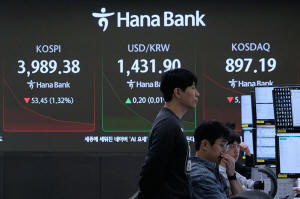Asian shares, oil prices fall back following Trump's meeting with
Chinese leader Xi
[October 30, 2025] By
TERESA CEROJANO
MANILA, Philippines (AP) — Asian shares initially retreated Thursday
after President Donald Trump’s meeting with Chinese leader Xi Jinping.
While Trump said the meeting was “amazing” and had resolved many issues,
investors appeared skeptical. U.S. futures were nearly flat.
Tokyo's Nikkei 225 index bounced lower and then inched up less than 0.1%
to 51,325.61 after the Bank of Japan kept its benchmark interest rate
unchanged.
Chinese markets gave up early gains, with Hong Kong's Hang Seng shedding
0.5% to 26,210.83. The Shanghai Composite index lost 0.7% to 3,986.90.
The Hong Kong Monetary Authority on Thursday cut its base rate by 25
basis points to 4.25%. It always follows the U.S. lead in interest rate
policies since the value of Hong Kong’s currency is linked to the U.S.
dollar.
South Korea’s Kospi index broke through the 4,000 mark for the first
time, edging up 0.1% to 4,086.89 after climbing more than 1% earlier in
the day following reports of progress in Washington’s trade talks with
South Korea. Solid corporate earnings also boosted shares in tech, auto
and shipbuilding.
Australia's S&P/ASX 200 shed nearly 0.5% to 8,885.50, pulled lower by
losses in real estate and consumer discretionary stocks.
Taiwan's Taiex dropped less than 0.1% while India's BSE Sensex shed
nearly 0.6%.
Trump told reporters he was cutting average tariffs on Chinese goods to
47% from 57%, effective immediately after his first face-to-face meeting
with Chinese leader Xi Jinping in six years. He cited progress by
Beijing in curbing exports of fentanyl and the chemicals used to make
it.

Trump also said China was keeping its policy of tighter restrictions on
exports of rare earths and related technologies on hold for a year, and
he expects that agreement to be extended. Trump’s aggressive use of
tariffs since returning to the White House for a second term combined
with China’s retaliatory limits on exports of rare earth elements have
given the meeting newfound urgency.
The first official Chinese comment on the meeting suggested any deal is
not done.
Xi noted that negotiating teams from both countries had reached a
consensus, a likely reference to talks held in Malaysia last weekend,
according to a report on the meeting distributed by state media.
The Chinese leader said the teams should complete follow-up work as soon
as possible to deliver tangible results that will provide “peace of
mind” to China, the U.S. and the rest of the world.
[to top of second column] |

Currency traders watch monitors near a screen showing the Korea
Composite Stock Price Index (KOSPI), left, and the foreign exchange
rate between U.S. dollar and South Korean won, center, at the
foreign exchange dealing room of the Hana Bank headquarters in
Seoul, South Korea, Tuesday, Oct. 28, 2025. (AP Photo/Ahn Young-joon)
 Xi, stressing that dialogue is
better than confrontation, listed a range of issues where China and
the U.S. could work together, including combating illegal
immigration and telecom fraud, anti-money laundering efforts,
artificial intelligence and infectious disease response.
The encounter was a chance for the leaders of the world’s two
largest economies to stabilize relations after months of turmoil
over trade issues.
On Wednesday, U.S. stocks bounced around their records after the
Federal Reserve made moves to boost the job market but also warned
that more help isn’t guaranteed.
The S&P 500 finished virtually flat and edged down by less than
0.1%. The Dow Jones Industrial Average dipped 73 points, or 0.2%,
and the Nasdaq composite rose 0.5%. All three indexes were coming
off an all-time high.
Stocks had been on track for modest gains in the afternoon after the
Fed cut its main interest rate for the second time this year in
hopes of helping the slowing job market. But the market snapped
lower after Chair Jerome Powell later warned that it “is not a
foregone conclusion” that the Fed will cut again in December at its
next meeting, “far from it.”
“That needs to be taken off the board,” Powell said.
In the meantime, the deluge continued of big U.S. companies
reporting how much profit they made during the summer, and the
frenzy in AI technology is driving growth. The pressure is on
companies to deliver gains because that’s one way they can quiet
criticism that their stock prices have shot too high.
In other dealings early Thursday, the benchmark U.S. crude shed 40
cents to $60.08 per barrel. Brent crude, the international standard,
lost 39 cents to $63.93 per barrel.
The U.S. dollar rose to 153.41 Japanese yen from 152.65 yen. The
euro edged up to $1.1612 from $1.1609.
___
AP Business Writers Elaine Kurtenbach, Stan Choe and Matt Ott
contributed to this report.
All contents © copyright 2025 Associated Press. All rights reserved |